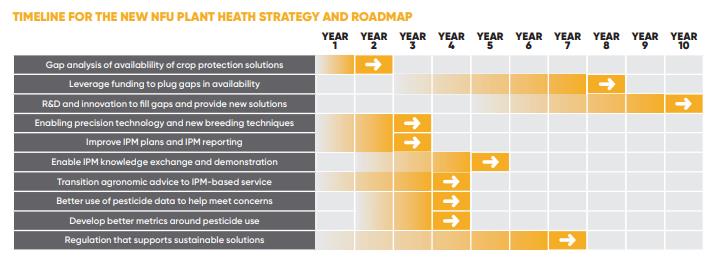There have been great improvements in plant health and crop protection in recent decades. The UK has the most advanced biosecurity measures it’s ever had, and its National Action Plan on sustainable use of pesticides is recognised as world-leading in raising standards and reducing risks. The UK Expert Committee on Pesticide Residues in Food consistently finds more than 97% of UK-produced food meets or exceeds trading standards. The EU is recognised as having the most stringent regulatory approval system for pesticides in the world and around 25% of current EU actives are recognised as low risk.
Despite these achievements, the challenges continue. It’s estimated that even with the use of pesticides, up to 40% of crops around the world are lost to plant pests, weeds and diseases. Other challenges include: the increasing development of resistance to pesticides; new pests and diseases invading the UK; a failing regulation that removes pesticides in a piecemeal way; public resistance to the adoption of innovative new technologies like biotechnology and new breeding techniques; and increased politicisation of the regulatory process.
Meeting the challenges is no mean feat; it will require many years of action and will need many organisations to work together. With that in mind, the NFU has worked with its national commodity boards to develop a roadmap to set clear priorities and timelines for our work over the next ten or more years.
The NFU’s vision is to develop sustainable plant health solutions that enable UK farmers and growers to produce crops that meet the needs of consumers, the environment and profitable and productive farming businesses.
The NFU also wants to help meet the challenges set by the government within the 25-year Environment Plan, to improve biosecurity and to put integrated pest management (IPM) at the heart of a holistic approach with, as it puts it, ‘the minimum use of pesticides’.
The roadmap focuses on five key areas:
Availability of solutions
For a resilient and effective choice of control solutions to be available for all key crop pests, weeds and diseases.
Integrated Pest Management
All pest, weed and disease control decisions to be made as part of an IPM approach.
Agronomic advice
To be provided as a fully IPM-based service.
Transparency
Improve understanding of the ‘why, what, when, how and where' of pesticide use to be better able to meet government and public concerns.
Regulation
A regulatory and policy framework that supports the development of sustainable plant health solutions.
NFU Deputy President Guy Smith said:
“This roadmap develops our current thinking and sets out a clear plan for where we need to focus future action.
“Farmers need effective tools to control the weeds, pests and diseases threatening their crops. We need to create cross-industry strategies to show our commitment to IPM, and deliver change and innovative solutions.
“Policy makers will then need to play their part to enable access to all the tools in the toolbox, to ensure a safe, secure, affordable supply of food for everyone.”
NFU Crops Board Chairman Tom Bradshaw said: “The NFU plant crops board chairmen believe this roadmap will harness innovation and focus action to provide growers with plant health solutions to run sustainable and profitable businesses, while ensuring needs of consumers and the environment are met – for me, it’s about healthy plants, healthy people and a healthy planet.”
Click on the image below to download a bigger version of the plant health strategy and roadmap timeline.
More from NFUonline:

